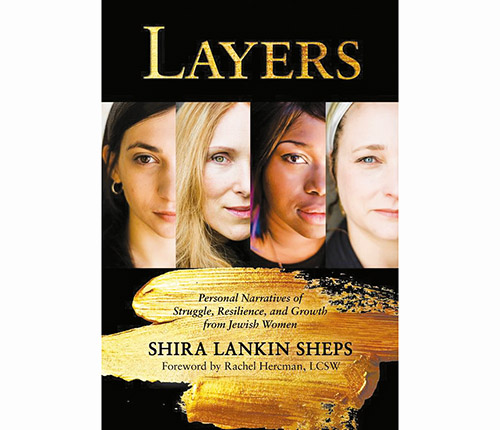


“Nobody has it all together,” observed Shira Lankin Sheps, author of The Layers Project, speaking to me from her home in Israel. “Miss Perfect doesn’t exist. I wanted to be her. I haven’t met her. But just because we’re not perfect, that doesn’t mean we’re not whole. That’s why I started this project.”
Shira, who grew up in Edison and lived in Fair Lawn before making aliyah three years ago, started The Layers Project as a blog and then collected stories for the book, published this year by The Toby Press, a division of Koren Publishing. The idea took shape after Shira graduated from a master’s degree program in social work in 2012 and became very ill. She grappled with admitting to herself and others that she had a debilitating, then undiagnosed, illness. But she started to recognize that she could still experience beauty with the pain. Once she could say out loud that she was not OK but she could keep moving forward anyway, she turned to finding other women who had stories of pain that was managed and tamed—not forgotten, or even overcome, but lived with, as one compartment in the background of an otherwise meaningful life. “I discovered there’s strength in struggles, in showing the world how to be multi-layered. It’s overcoming a mindset to make meaning from the struggle.”
Shira gives women a voice for their stories, and a public face for their identities. She doesn’t agree with frum media that have a policy of not publishing photos of women. So she learned how to make technically and emotionally beautiful portraits to go along with the text. “I decided the only way to fix that was by role modeling how to do it well,” she said. “I dragged myself to take courses online and opened a photography business. I really enjoy capturing moments and emotion.” Photography brings a visual dimension to her profiles. “When someone is telling a painful story and you look in her eyes, there’s eye contact right to the lens, a connection that’s forged in these portraits. I want the reader and the person sharing the story to connect. I get feedback from readers that when they finished the book, they felt like they wanted to share their own stories, because these women would understand.”
Once I opened the book, it was difficult to stop. I looked forward to reading a chapter whenever I had time. The stories don’t have fairy tale endings but they are about triumph: women who come to realize after much suffering that they can choose to rewrite their approach to life and live well. Tzippi was traumatized by living through war in Israel as a child, only to find as an adult that Israel was where she belonged. Malka developed cerebral palsy from being oxygen deprived at birth but went on to become an educator, wife and mother. Shira suffered through eating disorders and cancer to arrive at self-acceptance and self-love. Lisa lost her husband and found love again. These women are honest about the pain in their lives, and grateful for realizing that they could lead a full life despite their circumstances. Each story begins with a full-color portrait of a woman looking through a lens into the mind and heart of future readers.
Every story in The Layers Project ends with a list of questions for self-reflection or book group discussion. It’s easy to turn the page; there won’t be a quiz. But slowing down to reflect on the questions asked gives you some insight into yourself that you would not have taken the time for otherwise. In this season, when self-reflection is part of the teshuva process to prepare for Rosh Hashana, spending some time with these questions feels less like a school assignment and more like a good therapy session.
The Layers Project online is a magazine now. Shira is still telling women’s stories—with so many followers, people reach out to her—only now she is focusing more on the nurturing we need to go along with the resilience. “Last year especially with COVID, I realized that for my own growth I needed self-compassion,” she said. “I looked back at the five years I’ve been doing this and I haven’t talked about love. I dragged myself from milestone to milestone. Now I need nourishment and kindness.”
She’s also beginning new writing projects, including a novel. “I had been saying for a while that I had a novel in me,” she said. “I woke up one morning and it was all there. I outlined the whole novel in one morning and I’m steadily chipping away at it.”
Shira is still adjusting to life in Israel and loving it. “Everything is vivid in intensity and color and richness—pleasure, joy and connection. It’s living on the edge of your seat. You never know what will happen from one day to the next.” She is happy to be getting excellent medical care, which she still needs for her illness. Much of living in Israel is about learning the system for everything and figuring out how to navigate it. Her three children are integrated into their schools and fluent in Hebrew. She has her parents and siblings nearby for support. “Life is hard, especially with corona, but so rich with meaning, beauty, family, friends and community,” she said. “I’m living my dream, achieving goals and milestones, driving myself every day but learning to be kind to myself in the process. I’m having a perfectly imperfect life.”
By Bracha Schwartz













